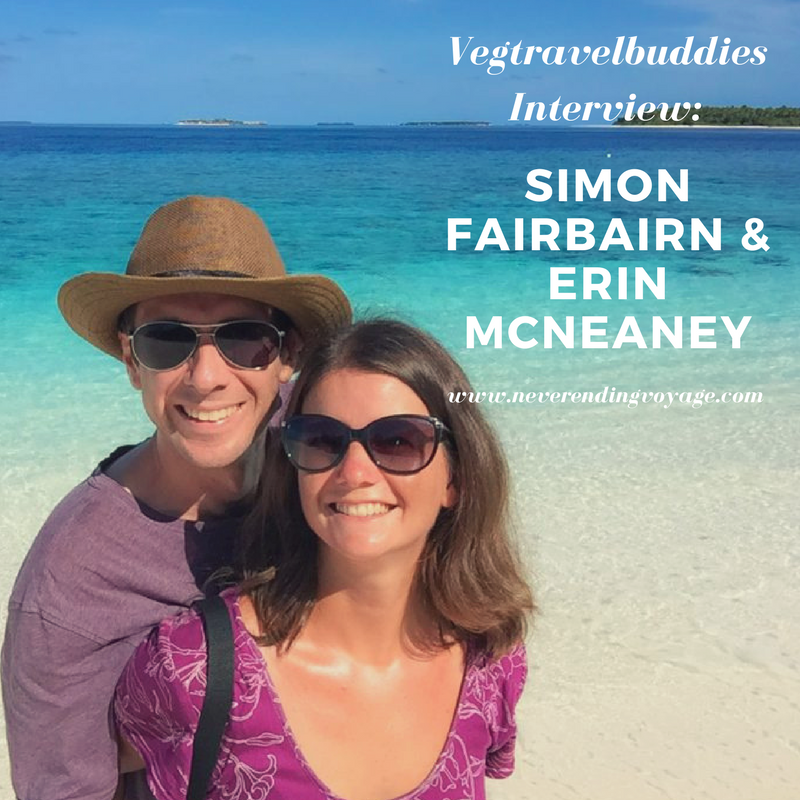
It all started in 2008 for digital nomad couple Simon Fairbairn and Erin McNeaney. Little did they know at that time that the year-long trip that took them to India, South East Asia, Australia, the South Pacific and the US would lead to a life-changing decision. Fast forward to 2010, Simon and Erin left the UK with one-way tickets and carry-on backpacks. And they have been traveling around the world since then. In this interview, we asked Erin about what was it like to leave everything behind and embrace the nomadic lifestyle, their experiences traveling as vegetarians, and more.
Q: What was it like to sell everything you owned and become digital nomads?
It was incredibly liberating. We took a year off our jobs to travel the world in 2008 and living out of a backpack we realised how little we really needed. Once we returned to the UK it wasn’t difficult to make the decision to sell up, start a business and head off on the road indefinitely. We love the freedom this lifestyle gives us.
Q: What is it like to spend most of your time away from home? How has extensive traveling changed you?
The UK doesn’t really feel like home to us anymore. We create temporary homes wherever we are – especially when we rent an apartment or house for a few months. We have become more adaptable and minimalist, aware of what we really need.
Q: How long have you been vegetarians? What made you switch to a plant-based lifestyle?
I’ve been a vegetarian since I was 10 (26 years ago). I loved animals and didn’t want to eat them. Simon turned vegetarian when we got together at age 18.
Q: What is the most fulfilling and most frustrating thing about traveling as vegetarians?
The most frustrating thing is not being able to try a lot of local food, especially street food.
The best thing is the satisfaction of researching the best vegetarian food and restaurants in a destination and sharing it with other vegetarians on our blog. This was especially true in Japan which is a difficult country for vegetarians without any planning but if you find the right places the food is amazing. You can see our vegetarian Japan guide here.
Q: Can you name the most veg-friendly places you have visited?
India is fantastic as it has a large vegetarian population and they understand the concept everywhere (you usually just have to order a “veg meal”).
Although Italians don’t always understand why we’d be vegetarian, it’s easy to find amazing accidentally veggie food there, especially in the south (like the regions of Puglia and Basilicata) where the food is more plant-based.
Certain cities that have a huge array of vegetarian restaurants include Chiang Mai in Thailand, Ubud in Bali, and Portland, Oregon in the US.
Q: Some things don’t always go as planned when you’re traveling. What was the worst experience you’ve had so far and how did you deal with it? What was the best experience you’ve had so far?
We’ve been lucky that nothing really bad has happened to us. Simon did have his wallet pickpocketed on a bus in Costa Rica but as we had most of our valuables in money belts under our clothes we didn’t lose much. We called the bank straight away to cancel our cards, tried not to let it get to us, and were more careful in crowded situations in future.
We have had so many amazing experiences that it’s hard to choose just one, but it’s probably the safari we did last year in South Africa where we got up close to lions, leopards, elephants, rhinos, and more.
Q: What’s your take on “don’t worry about money, just travel” advice?
While I think it’s possible to travel on a budget and don’t think people should let the lack of money stop them, I also think it’s best to save up as much as you can before you leave. Travelling on a super tight budget can be stressful and uncomfortable and it’s good to have a safety net.
Q: Any tips for people who want to travel but feel financially stuck?
Start tracking your expenses – literally every penny you spend – so you can see where you are spending your money. Look at areas you can cut down on. Can you start cooking more and eating out less for example? Then set a monthly savings target and stick to it. It could take you years to save for a big trip but it’s worth it.
It’s also a good idea to continue tracking your expenses on the road in order to stick to a budget and not worry that you’ll run out of money. We created the Trail Wallet iOS app to help travellers (and us) track their expenses.
Q: You spend a lot of time traveling. What is the longest time you’ve spent in one place?
We’ve visited Ubud in Bali twice since we’ve been nomadic – once for four months and once for five months. We love the amazing vegetarian food, the gorgeous rice field scenery, the interesting culture with lots of temple ceremonies, and being able to rent a house with a pool.
Q: If you could give one piece of advice to new or aspiring vegetarian travelers, what would it be?
Plan in advance – find out what local dishes are vegetarian and which restaurants have vegetarian options. I create a custom Google Map with the restaurants as well as the sights I want to see so that I can find the nearest place to eat. The HappyCow app is also useful for this. There’s nothing worse than being starving and not being able to find somewhere to eat. And carry snacks just in case!
-----
Follow the Never Ending Voyage on Facebook, Instagram, and Twitter
Website: www.neverendingvoyage.com

